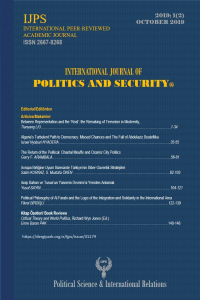Öz
Arap Baharı sonucunda yaşanan bazı Orta Doğu ve Kuzey Afrika ülkelerinin feci sonuçları, bölgedeki demokrasi taleplerine neden olan başka bir insan dalgasının olacağı yönündeki umutları sulandırdı. Bu nedenle, protestocular Cezayir'deki büyük şehirlerin caddelerine döküldüklerinde ve beşinci dönem başkanlığına itiraz eden cumhurbaşkanı Bouteflika'nın saltanatına son verdiklerinde, çoğu kişi artık tanıdık bir kan dökülmesi ve yıkım olayına neden olacağı konusunda şüpheli kaldı. Yemen, Suriye ve Libya'da tanık oldu. Bu makale, Cezayir’in demokrasi, kaçırılmış fırsatlar ve Bouteflika’nın kansız düşme arayışı içindeki çalkantılı seyahatini incelemeyi amaçlamaktadır. Ordunun Cezayir’in siyasetine dahil olmasının demokrasinin önündeki en büyük engel olduğunu ve Bouteflika’nın askeri destekli rejiminin düşüşüne yol açan son olayların siyasi reformlara daha açık bir yol açabileceğini savunuyor.
Anahtar Kelimeler
Kaynakça
- Amir A., Charlotte B., & Madjid Z., (23 February 2019). "Algérie:révolte inédite contre le pouvoir". Le Monde Holm, U. (2005). Algeria: President Bouteflika's Second Term. Mediterranean Politics, 10(1), 117-122.Guliyev, F., (February 28, 2009), End of Term Limits: Monarchical Presidencies on the Rise Harvard International Review. Available at SSRN: https://ssrn.com/abstract=1417532Mortimer, R. (2006). State and army in Algeria: the ‘Bouteflika effect’. Journal of North African Studies, 11(2), 155-171.Zoubir, Y. H., & Aghrout, A. (2012). Algeria's Path to Reform: Authentic Change?. Middle East Policy, 19(2), 66.Addi, L. (1997). Political Islam and democracy: the case of Algeria.Aghrout, A., & Zoubir, Y. H. (2009). Introducing Algeria’s President-for-life. Middle East Report.Brumberg, D. (1991). Islam, elections, and reform in Algeria. Journal of democracy, 2(1), 58-71.Editors of Encyclopaedia Britannica, (April 2, 2019) Abdelaziz Bouteflika, Encyclopædia Britannica Encyclopædia Britannica, inc. https://www.britannica.com/biography/Abdelaziz-BouteflikaDarbouche, H. (2009). Algeria’s chequered democracy experiment. Struggling Transitions and Proliferating Dynasties: Democratisation’s Trials in the European Neighbourhood, Centre for European Policy Studies, Brussels.Dessi, A. (2011). Algeria at the Crossroads: Between Continuity and Change. Universitäts-und Landesbibliothek Sachsen-Anhalt.Filiu J. P. (2009), “Al-Qaeda in the Islamic Maghreb: Algerian Challenge or Global Threat?”, Carnegie MEP Paper No. 104, Carnegie Endowment for International Peace, Washington, D.C./Beirut.Halaçoğlu, C. (2013). Occupation and The Colonization Of Algeria From 1830 To 1870: A Struggle For Dominance (Doctoral Dissertation, Middle East Technical University).Joffé, G. (2008). National reconciliation and general amnesty in Algeria. Mediterranean Politics, 13(2), 213-228.ICG, 2000. The Algerian Crisis: Not Over Yet, Africa Report No. 24, ICG, Algiers/Paris/London/Brussels.Mortimer, R. (2006). State and army in Algeria: the ‘Bouteflika effect’. Journal of North African Studies, 11(2), 155-171.Roberts, H. (2007). Demilitarizing Algeria. Washington, DC: Carnegie Endowment for International Peace.Syed, M. (2013). Egypt and Tunisia: Testing Grounds for Goldstone's Assertions on the Revolutionary Process. Security Strategies Journal, 9(18).Tlemçani, R. (2008). Algeria under Bouteflika: Civil strife and national reconciliation (Vol. 7). Washington, DC: Carnegie Endowment for International Peace.
Öz
The disastrous consequences some Middle East
and North African countries experienced as a result of the Arab Spring diluted
any hopes that another wave of people driven demands for democracy would be on
the horizon in the region. Therefore, when protestors poured on the streets of
major cities in Algeria demanding and end to the reign of president Bouteflika,
who was contesting the presidency for a fifth term, many remained sceptical
that this would result to a now familiar case of bloodshed and destruction
being witnessed in Yemen, Syria and Libya. This article seeks to examine
Algeria’s turbulent journey in search of democracy, the missed opportunities
and the bloodless fall of Bouteflika. It argues that the involvement of the
military in Algeria’s politics has been the biggest obstacle to democracy, and
the recent events that led to the fall of the military supported regime of
Bouteflika could mark the beginning of clearer path to political reforms.
Anahtar Kelimeler
Kaynakça
- Amir A., Charlotte B., & Madjid Z., (23 February 2019). "Algérie:révolte inédite contre le pouvoir". Le Monde Holm, U. (2005). Algeria: President Bouteflika's Second Term. Mediterranean Politics, 10(1), 117-122.Guliyev, F., (February 28, 2009), End of Term Limits: Monarchical Presidencies on the Rise Harvard International Review. Available at SSRN: https://ssrn.com/abstract=1417532Mortimer, R. (2006). State and army in Algeria: the ‘Bouteflika effect’. Journal of North African Studies, 11(2), 155-171.Zoubir, Y. H., & Aghrout, A. (2012). Algeria's Path to Reform: Authentic Change?. Middle East Policy, 19(2), 66.Addi, L. (1997). Political Islam and democracy: the case of Algeria.Aghrout, A., & Zoubir, Y. H. (2009). Introducing Algeria’s President-for-life. Middle East Report.Brumberg, D. (1991). Islam, elections, and reform in Algeria. Journal of democracy, 2(1), 58-71.Editors of Encyclopaedia Britannica, (April 2, 2019) Abdelaziz Bouteflika, Encyclopædia Britannica Encyclopædia Britannica, inc. https://www.britannica.com/biography/Abdelaziz-BouteflikaDarbouche, H. (2009). Algeria’s chequered democracy experiment. Struggling Transitions and Proliferating Dynasties: Democratisation’s Trials in the European Neighbourhood, Centre for European Policy Studies, Brussels.Dessi, A. (2011). Algeria at the Crossroads: Between Continuity and Change. Universitäts-und Landesbibliothek Sachsen-Anhalt.Filiu J. P. (2009), “Al-Qaeda in the Islamic Maghreb: Algerian Challenge or Global Threat?”, Carnegie MEP Paper No. 104, Carnegie Endowment for International Peace, Washington, D.C./Beirut.Halaçoğlu, C. (2013). Occupation and The Colonization Of Algeria From 1830 To 1870: A Struggle For Dominance (Doctoral Dissertation, Middle East Technical University).Joffé, G. (2008). National reconciliation and general amnesty in Algeria. Mediterranean Politics, 13(2), 213-228.ICG, 2000. The Algerian Crisis: Not Over Yet, Africa Report No. 24, ICG, Algiers/Paris/London/Brussels.Mortimer, R. (2006). State and army in Algeria: the ‘Bouteflika effect’. Journal of North African Studies, 11(2), 155-171.Roberts, H. (2007). Demilitarizing Algeria. Washington, DC: Carnegie Endowment for International Peace.Syed, M. (2013). Egypt and Tunisia: Testing Grounds for Goldstone's Assertions on the Revolutionary Process. Security Strategies Journal, 9(18).Tlemçani, R. (2008). Algeria under Bouteflika: Civil strife and national reconciliation (Vol. 7). Washington, DC: Carnegie Endowment for International Peace.
Ayrıntılar
| Birincil Dil | İngilizce |
|---|---|
| Konular | Uluslararası İlişkiler |
| Bölüm | Makaleler |
| Yazarlar | |
| Yayımlanma Tarihi | 1 Ekim 2019 |
| Gönderilme Tarihi | 5 Mayıs 2019 |
| Kabul Tarihi | 16 Ağustos 2019 |
| Yayımlandığı Sayı | Yıl 2019 Cilt: 1 Sayı: 2 |
Veri Paylaşım Politikası
Bu dergi, yazarları bilimsel etik ve atıf kuralları ile kişisel hakların korunmasına yönelik evrensel ve yasal kriterler çerçevesinde kalırken araştırmaları sonucunda elde ettikleri verileri paylaşmaya teşvik etmektedir. Bu bağlamda IJPS, Budapeşte Açık Erişim Girişimi Deklarasyonunu (2001) benimser.


